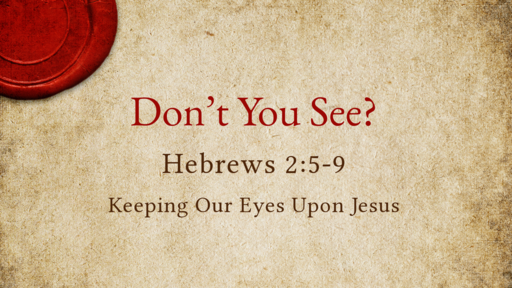Don't You See?

Come, See...
Seeing But Not Seeing
Fixing our Eyes Upon Jesus
Man is the Crowning Glory of God’s Creation
Man - Prophet, Priest, King
Jesus - Prophet, Priest, King
“BUT NOW...”
But We Do See...
Diagnostic Questions
Don’t You See?
Don’t You Understand?
He Is not Here He is Risen...
His death was the predestined manner and moment of our salvation (Acts 4:28). That this is the reality beyond the appearance is confirmed by the resurrection, ascension, and glorification of Jesus, by which, despite all present appearances, the resurrection, ascension, and glorification of those who are one with him by faith is assured. Moreover, the same Jesus who died on earth and is now exalted above all knows and is known by his people (cf. Jn. 10:14) and will return majestically at the end of the age to drive away every false appearance and establish the reality of his dominion for all eternity (Acts 1:11; Rev. 22:12, 16, 20f.).
For the follower of Jesus, too, the road is one that leads by way of suffering to glory, as 2 Timothy 2:12 reminds us: “if we endure, we shall also reign with him” (cf. 2 Thess. 1:4f.; Acts 14:22, “through many tribulations we must enter the kingdom of God”). Seen within this perspective, the cross is an essential event in the glorification of Jesus (N.B. Jn. 12:23